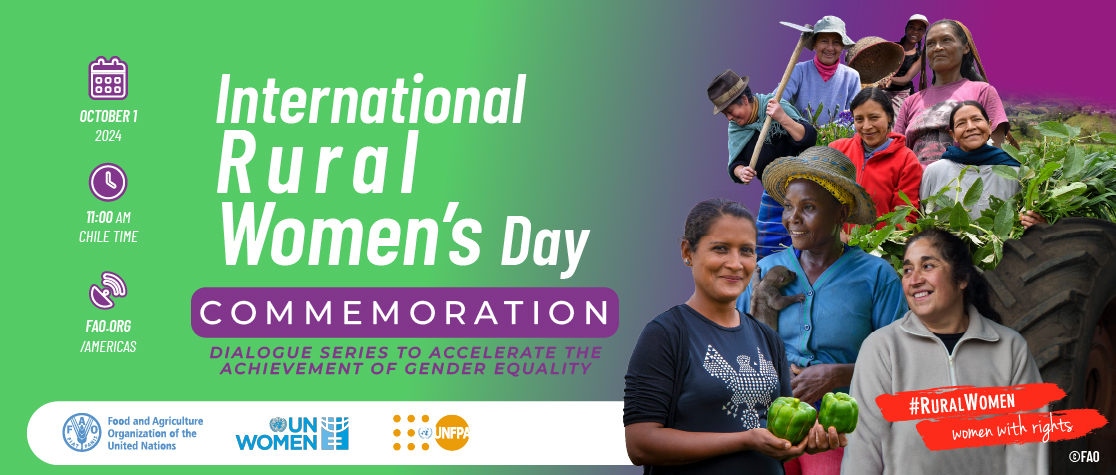Event to Commemorate the International Day of Rural Women
Virtual Event, 01/10/2024

Live broadcast
Context
In Latin America and the Caribbean, women and their organizations represent one of the key actors in transforming traditional agrifood systems into sustainable, resilient, and inclusive models by 2030.
However, rural women continue to face multiple gender inequalities that affect their access to productive resources, such as land, tools, or technological innovation, among others.
This makes it difficult for them to be recognized as producers and beneficiaries of various forms of support and incentives, including training, financing, and state assistance, which prevents the full consolidation of sustainable, resilient, and inclusive agrifood systems.
Additionally, rural women face a significant burden of unpaid care work, both in the family and community spheres, closely related to the caregiving roles that our societies define as feminine.
As a result, rural women face greater job insecurity, are often situated in the least profitable segments of value chains and have limited access to contributory and non-contributory social protection, greatly increasing the feminization of poverty, the incidence of food and nutritional insecurity among them, and reducing their resilience to crises, events, and shocks associated with climate change.
Globally, female-headed households experience an average annual income loss of 8 percent due to heat stress and 3 percent due to flooding, compared to male-headed households. Additionally, a 1°C increase in long-term average temperature is associated with a 23.6 percent reduction in farm income and a 34 percent reduction in total household income for female-headed households, compared to male-headed households1.
Despite the notable increase in many biodiversity-friendly practices, such as agroecology, organic farming, sustainable forest management, agroforestry, integrated pest management, and the ecosystem approach to fishing and aquaculture, biodiversity is decreasing at the genetic species and ecosystem levels (FAO, 2019b). For example, plant diversity in farmers' fields is decreasing in some countries, and more than one-third of fish stocks are overexploited. Women and other vulnerable social groups tend to rely more on biodiversity for their livelihoods, as crops and livestock breeds constitute their only source of food and income. Therefore, they are disproportionately affected by biodiversity loss, ecosystem degradation, climate change, and natural disasters (Sallan, 2020; IPCC, 2021; IUCN, 2015).
With the primary objective of supporting the initiatives of rural women and their organizations, the Food and Agriculture Organization of the United Nations (FAO) launched the Rural Women Empowerment and Environmental Sustainability Acceleration Programme, a regional initiative that will transformatively support the economic, social, and political empowerment of rural women while contributing to biodiversity conservation and ecosystem restoration.
In light of this adverse scenario, and with an focus toward the 16th Conference of the Parties to the Convention on Biological Diversity (COP16), FAO, UN Women, and UNFPA are inviting rural women's organizations to participate in a dialogue focused on identifying the main challenges, strengths, and solutions to close gender gaps related to poverty, food insecurity, and biodiversity conservation in the agrifood systems of Latin America and the Caribbean.
Objectives
To share the reflections and community proposals of rural women and their organizations in order to close the gender gaps associated with poverty and food insecurity through the sustainable use and conservation of biodiversity in the agrifood systems of Latin America and the Caribbean.
Target
The dialogue will feature organizations, networks, and regional coalitions of rural women and leaders, especially those formed by Indigenous, Afro-descendant, and/or young women. In addition, governments from the region, academia, civil society organizations, UN system agencies, and actors involved in the development of COP16 on biodiversity, among other key players, will be invited to contribute to closing the equality gaps between rural women and men.
Methodology
The dialogue will be an online space aimed at identifying, from an intersectional perspective, the main challenges, strengths, and solutions to close the gender gaps associated with poverty, food insecurity, and the sustainable use and conservation of biodiversity in the agrifood systems of Latin America and the Caribbean.
The event will be facilitated by FAO, in partnership with UN Women and UNFPA, and will offer Spanish-English interpretation services and live streaming through FAOAmericas.
Through virtual platforms, participants will have the opportunity to submit their questions and comments for the panelists.
Documents
Contact
Communication Specialist of the Regional Program of the Mano a Mano Initiative for prosperous and inclusive rural societies.
Technical Assistant for Implementation and Awareness Raising
